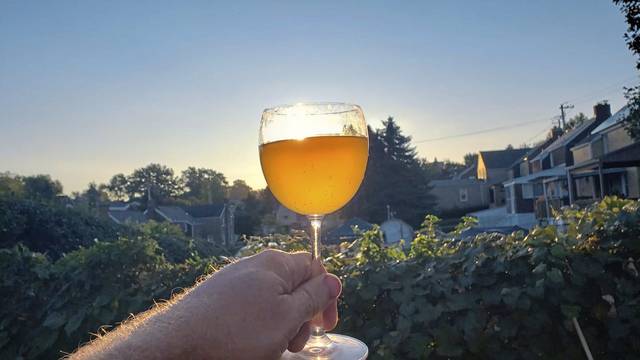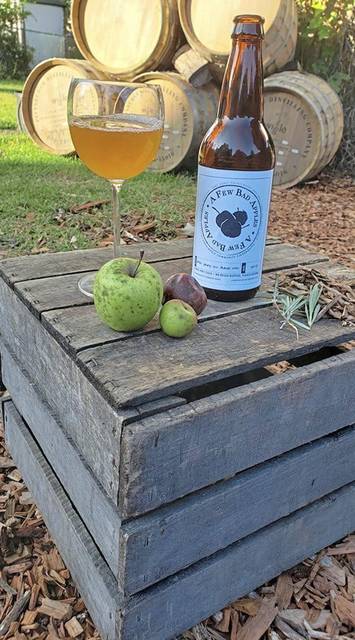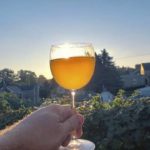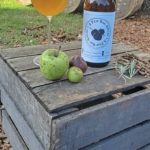As a kid, Mike Sturges was urged by his mother to set up a roadside stand and sell apples from his parents’ Gibsonia property. When his first-grade teacher stopped to buy some, Sturges was too embarrassed to sell her any. The fruit didn’t meet stereotypical schoolhouse standards: It was blemished and oddly shaped, not smooth, red and perfectly round.
These days, Sturges, 41, gets high marks when it comes to sustainability. He seeks out imperfect fruit that might go to waste — and turns it into hard cider.
In 2005, he and a group of friends launched A Few Bad Apples, an organization that transforms unwanted fruit and invasive plants into a delicious low-alcohol beverage. The ingredients — including crabapples, elderberries, knotweed and autumn olive — are harvested from public spaces and private yards throughout the Pittsburgh region. Sturges compensates landowners by handing over some of the picked produce or by delivering a jug of the elixir generated from it. The team even prunes their trees for them.
“We want to get you into the idea of preventing waste and using something that doesn’t necessarily look fantastic, but is edible,” he says. “It’s hard to get people interested in sustainability and acting to prevent food waste by handing them a knobby, pitted piece of fruit. If you give them a glass of hard cider made from that fruit, it can make them a believer.”
Members started out using a food processor and cheesecloth and eventually upgraded to a Civil War-era ciderpress. Now, to make things more efficient, they often go electric to generate more juice. Whole apples are tossed in and smashed into pomace, a fibrous mass. Fermentation takes about 10 days, although some ciders are aged in oak barrels for years. The alcohol content is generally about 6%.
A Few Bad Apples isn’t a licensed cidery, so they can’t sell the beverage. They donate it to charity events, community fundraisers and private parties.
On Oct. 19, the collective will hold its fifth annual Ciderfest, in the Spring Hill neighborhood on Pittsburgh’s North Side, at The WBU Event Venue (home of Spring Hill Brewing). In addition to boozy offerings, ticket buyers will enjoy live music from The Armadillos, The Turpentiners and Ye Olde Royal ****House Players. A portion of the proceeds will benefit Allegheny CleanWays.
Guests can expect to sample one-of-a-kind sippers that go beyond your basic fermented apple juice. Sturges has, for example, made cider from black trumpet mushrooms and raw honey. The fungi-based beverage tastes like apricot with an earthy finish.
Of course, apples are at the organization’s core.
This is prime time for picking. All of Pittsburgh’s 90 neighborhoods have fruit trees and their branches are bursting from July through mid-October.
Sturges, who has a full-time job in human services, loads up his truck with ladders and sacks, and cruises around town in search of nature’s bounty. He once bagged 800 pounds of apples in just under four hours.
When he was picking the apples, his wife, Jennifer, was picking quinces in Danielle Spinola’s yard. She’s the owner of Tupelo Honey Teas, a Millvale business gearing up for Ok-TEA-beerfest on Oct. 5. The tea-centric take on the traditional Oktoberfest celebration will be held at Tupelo, 211 Grant Ave.
A Few Bad Apples will be pouring at Ok-TEA-beerfest.
They are working on batch comprised of genmaicha tea (green tea with brown rice) and hops from the Millvale Community Garden that were blown off the vine during a summer microburst. One of their most popular concoctions is a cider made with Earl Grey tea, lavender and rosemary. These infusions have influenced a lot of for-profit cideries throughout the state.
The organization is part of the Pennsylvania Cider Guild and has collaborated with some of the businesses, including Verona’s Stonewall Cider House & Meadery and Jack’s Hard Cider in Biglerville.
Members have discussed going mainstream, but they don’t want to lose sight of their original objectives: education and outreach.
“Basically, we started off as a group of friends who saw an opportunity to make some delicious cider out of fruit that wasn’t being used,” Sturges says. “Over the last 15 years, we have seen the potential for that process as a means of building community, educating people about sustainability and a passion for making cider out of things that would otherwise go to waste.”











